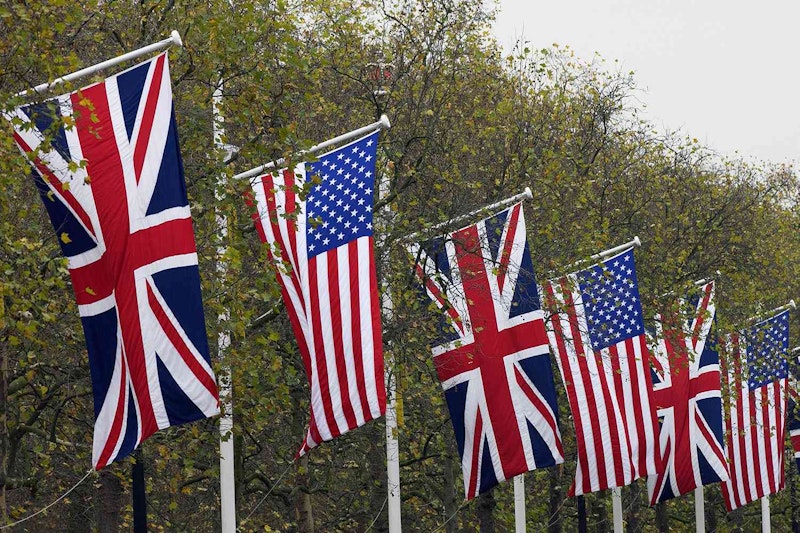"'Oh dear, I’ve managed to do something stupid,’” says a Yank. He’s describing the state of mind of a second Yank, one who had just “sorted out” a blackmail problem by killing the blackmailer. The first Yank had to do some hasty finagling to make sure “no unpleasantness might attach” to the rascal, and then this rogue, the second Yank, “seemed to think himself clever.” The first Yank couldn’t take it; driven past endurance, he lashed out with lethal effectiveness. After which he felt better, correct? “Yup, you’re right,” the man allows. “I was like euphoric.”
You’ll notice that there are two gears to his diction. One is mysteriously British, but the other is robustly American—and no wonder, since he was “raised on the back streets of L.A.” Really, he says, dealing with the blackmailer just called for “some kinda compromise.” But no, his now-deceased buddy ignored him and wound up “kinda hysterical.” As we say in this country, everything pretty much turned to shit. Still, the guy allows gamely, “full marks to the police.”
The above material gives away just about everything regarding the story, so I’ll keep back the name of the whodunit under discussion. But you’ll have guessed that the book’s British, distinctly so. The author, a bear for research, describes one character’s success on the American stage: “She’d recently won an Emmy for her work in a Broadway musical.” He also displays an exaggerated notion of the place of firearms in American life; hard to do, but he manages. Otherwise the book skates by okay, fact-wise. In the United States we do have entertainers, lawyers, and crazy heiresses, and the American characters on display here are indeed a crazy heiress, a lawyer, and two entertainers. The problem is their dialogue, which is piebald: British with splotches of kinda and gotta and, like, yeah.
Oh, but wait. “Hey, hey, just a minute,” one character cautions me. “Jeez!” exclaims another. All right, I’ll admit you can get a lot of—no, a lotta—mileage out of kinda and the rest. A crazy heiress, if American, may indeed say her father died “when I was, like four” and that her mother then married “this total asshole.” A lofty TV star may pronounce “No problemo” to reassure an acquaintance, and “Can it, Lefty” when his sidekick needs to button up. The star’s ex-wife, negotiating the difference between British pissed (drunk) and American pissed (annoyed), may describe him sarcastically as “the regular guy nobody gets pissed with,” and she might well demand “Howdja mean?” when puzzled by a turn in the conversation. But she’d denounce her ex as basically a drunk, not “basically a soak,” and she wouldn’t say he was “Mean in every sense of the word”; over here “mean” just means mean and doesn’t mean cheap.
Nor would this angry lady or her lawyers “throw the whole lot” at anyone or be “looking at the whole lot,” because in American speech “lot” doesn’t hang out with the definite article, only the indefinite; try “throw it all,” “throw everything,” “the whole shebang” (to be a bit stagey), or “everything and I mean everything.” Americans do say “sort out,” but not as often as the Brits; where the ex-wife says, “I’ve got some things that need sorting out” and cautions that “the lawyers need to sort out the details,” we’d say “straighten out” or, for a friendly negotiation, “iron out.” Further, “sort out” doesn’t pick up a triumphant or confrontational tinge when we use it, so the ex-husband’s lawyer would skip the dry but ominous “I think she just wants to sort you out” for the slambang “wants to straighten your head out.”
The lawyer’s client wouldn’t recall “dodgy investments,” the lawyer wouldn’t refer to “monies” from the client’s old TV show, and trouble with the police wouldn’t cause the lawyer to say he was in “a real shithole.” Americans use that last phrase when a particular motel, city, apartment, nation, bus station, encampment, or other physical site proves shockingly below standard. (But not, in my view, a swamp, a dump, or a bone-littered canyon; the place has to be somewhere that ought to be good but falls short because of other human beings’ slackness, crookedness, or stupidity.)
Above all, Americans don’t talk elegant and sleek. The debonair euphony on tap for the Brits, their “seemed to think himself clever,” their “no unpleasantness might attach”—it ain’t for us. Our readymade constructions (as opposed to slang) are present to make sentences plumper and more portly, especially when dudgeon must be expressed (“I don’t appreciate,” “Might I suggest,” etc.). Otherwise we go staccato, not to say guttural. The ex-wife wouldn’t unleash a stinging “I have long since ceased to care what Kenny likes or doesn’t like,” but instead the far more stinging “Yeah. What Kenny likes.” The ex-husband wouldn’t refer to his nemesis as “the fragrant Lilith,” not unless she had body odor and he was going for a full-body putdown, and even then he wouldn’t think of it. He wouldn’t refer to his “misplaced generosity” either. He’d shake his head and say, “And money. I mean, Jesus, these creeps I used to know. Losers.”
My point is, like look… the British? With the words, that kind of thing, I think they got it over us. I’m talking in general. But not all the Brits all the time, and not when it comes to such associated skills as duplicating the way a given type gives voice. The ones that think otherwise should read an English mystery novel that was written in a powerful hurry. I think it would be a most salutary experience, kinda.

